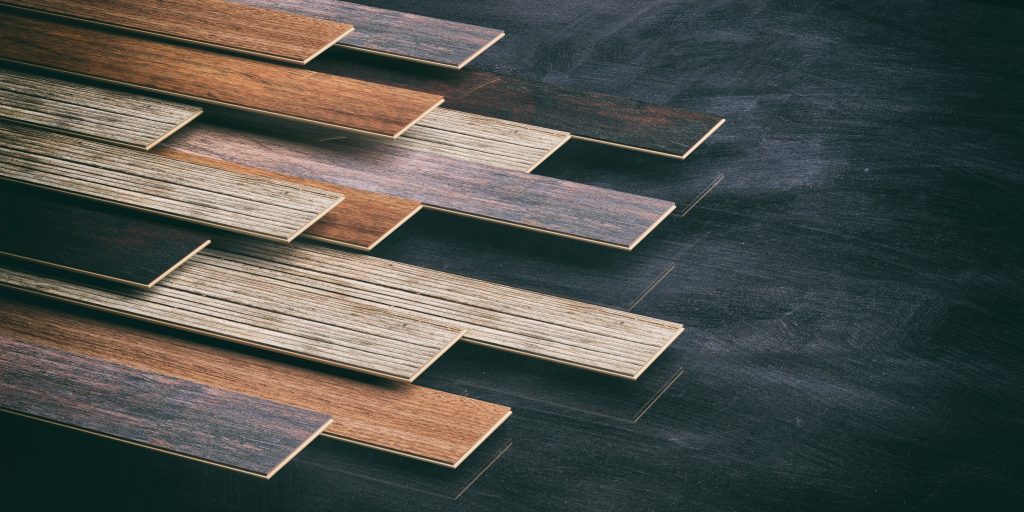The flooring you choose for your home is a big deal. It can either serve you well or cause you grief depending on how it well it fulfils your particular needs. Vinyl plank flooring is a stylish, inexpensive and resilient option. If you’ve decided that the plank form of flooring is best for your home, the next step is figuring out which type of flooring it should be. Here is how vinyl plank flooring compares to other favourite plank flooring options to better inform your decision.
Vinyl plank flooring
Vinyl flooring is constructed from a type of plastic — polyvinyl chloride — that is coloured and formed into sheets. The plank form developed as an alternative to the sheet form because it does not curl up and can be replaced piecemeal. Its other advantage is that it does not need to be glued down, allowing for a floating floor. That aspect makes it one of the easiest options to install since one can simply use the click-together method.
Recent improvements have also made it much more resistant to the risk of tearing or puncturing from sharp objects and furniture. New generation vinyl is high-quality and low VOC, adhering to strict air quality standards. Although vinyl plank flooring is not as heat-safe or fire-safe as some other floorings and will melt rather than burn, it takes an extreme amount of heat to ruin it. It actually retains warmth and so can save you money on heating your floor. It has a soft feel underfoot.
Vinyl plank flooring cannot handle wax polishes but instead has its own kind of polish. However, it is very easy to clean and maintain. You can also use a repair pen to quickly fix minor scratches.
The one major drawback is that it is not recyclable or biodegradable. As the most inexpensive option, though, it doesn’t get better than vinyl plank flooring. The durable flooring option is 100% waterproof thanks to a sealant. In addition, it’s available in a wide variety of styles and colours, including wood and stone looks. It has a tendency to bounce back from the pressure of heavy furniture, and it’s excellent for high-traffic areas, making it fitting for families or people with dogs. Its flexibility makes it especially popular for kitchens, bathrooms and commercial buildings.
Linoleum plank flooring
There is much confusion between vinyl and linoleum flooring due to their similarities in appearance. Linoleum plank flooring is available in a wood look just like vinyl plank flooring. But do not be fooled; they are made of completely different materials. Linoleum is made of layers of linseed oil, pine resin, ground cork dust, wood flour, and mineral fillers.
Certain physical properties distinguish linoleum from vinyl. Linoleum is sustainable, being both recyclable and biodegradable. It can last a long time, but needs more maintenance than vinyl does. It is water-resistant, not waterproof. Improper installation can lead to water damage, and it is more expensive than vinyl.
Hardwood plank flooring
Although timber flooring can be softwood or hardwood, it is hardwood that works well for high-traffic areas. The Australian Buloke tops the list in terms of strength compared to other species and is the hardest wood in the world. Hardwood flooring is durable, and its typical thickness can handle repeated sanding and refinishing. It is also slow to burn and less likely to catch fire than softwood. Another thermal property is its ability to maintain temperature stability in the home.
Hardwood is prone to scratches and other blemishes, but some homeowners feel these blemishes add to its patina and charm. Without a sealant, it is also vulnerable to water damage and discolouration. So, unlike vinyl plank flooring, it is a poor choice for moisture-prone areas.
Engineered hardwood plank flooring
The cheaper alternative to regular hardwood, engineered hardwood has a top and bottom layer of natural wood sandwiching five to seven layers of plywood. Veneers can add to its appearance, durability, and allow for a limited amount of sanding and refinishing. Like natural hardwood, it is water-resistant but not waterproof and so will risk mould, mildew and rot in a bathroom.
When choosing a flooring option for your home, it is a good idea to research the pros and cons of each and even compare those with the same shape. Vinyl plank flooring is one of the best options for modern homeowners because it is waterproof, fashionable, adaptable, cost-effective and hardy enough for any room. It is a tough competitor against other popular flooring options and so will continue to be in the market for years to come.
To learn more about our vinyl plank flooring options, contact us.

